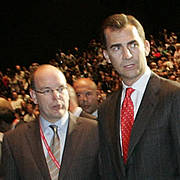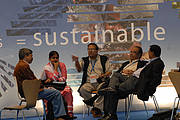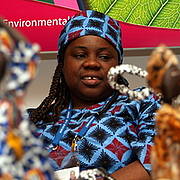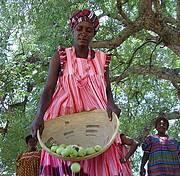IUCN's Congress: the common denominator
01 April 2012 | Article
The IUCN World Conservation Congress is a unique platform gathering people from all ranks of society under the same roof. Encompassing a wide range of viewpoints, the Forum is the perfect environment to share knowledge and reach a rounded vision on conservation.
Nature concerns all of us, no matter who we are, what we do or where we live. It is the common denominator between us. Only, this simple truth is fogged by geographical, cultural, political and economic constructs. Social imbalance often leads to inequitable access to natural resources, making the struggles of those most deprived even more difficult.
The connection between equitability and conservation will be discussed at the Congress during a day dedicated to the theme “Efficient and equitable governance of nature’s use”. More and more, it is acknowledged that poverty needs to be tackled when addressing sustainable development.
Sharing the benefits
According to Sonia Peña Moreno, Senior Biodiversity Policy Officer at IUCN, social aspects should always be embedded within conservation as humanity has all to gain from conserving nature. The notion of equity was formally expressed with the establishment of the Convention on Biological Diversity (CBD) in 1992. Specifically, the CBD looks at the issue through the equitable sharing of benefits derived from the use of genetic resources.
Access to genetic resources, for example medicinal plant molecules, and benefit-sharing is referred to as ABS and illustrates well the complexities of the debate. “The fact that fairness and equity are at play here is all the more complicated because many interests have to be taken into consideration; there are many levels of governance and many stakeholders involved,” says Peña Moreno.
ABS is a sensitive issue because it addresses how “users of genetic resources” (e.g. pharmaceutical companies and research institutes) access biodiversity-rich areas and how “providers” (e.g. local governments and indigenous communities) get compensated from any resulting exploitation. Added to this is the age-old debate on territorial rights and where we draw the line between private and common property. “And if you don’t have any regulation,” says Peña Moreno, “it’s even more difficult to ensure that all the checks are in place.”
Shedding light on a complex issue
So how does IUCN tackle this complex issue? “The Union supports Parties to the CBD by providing policy recommendations under specific frameworks within the Convention. We also help countries better understand ABS through the development of technical publications and participation in field projects. We give technical and policy advice based on our experience and our field work.”
The stories reported back from hands-on conservation work are a rich source of information when devising the best course of action. Sonia Peña Moreno talks about a “feedback loop”, from the global to the regional level and back to the global arena: “If you don’t allow for that exchange to happen, literally with one foot on the ground and the other in policy debate, the latter remains within its own theoretical confines – it’s without any reality check.”
IUCN’s field projects feed a pool of knowledge gathered all around the world. Such resources are fundamental to identify effectively where our attention is most needed. “The lessons learnt, experience and knowledge from the implementation of projects on site are brought to the higher policy level. The structure of IUCN makes that dialogue possible,” she explains.
A broad mix
Participants at the next IUCN Congress, IUCN’s highest decision-making body – will range from global policy-makers in the private and public sectors to members of small-scale NGOs, regional communities and academia, to name a few.
Such a broad mix of people connecting together, with wide-ranging conservation interests and varying levels of influence, helps develop concrete and practical solutions rather than purely theoretical ideals.
Sonia Peña Moreno adds that “a lot of smaller scale projects would probably come out of the type of discussions happening at the Forum side of the IUCN Congress, for instance.” The Forum is a conservation debate hub that is open to all, featuring knowledge cafés, workshops, training courses, poster sessions and five high-profile World Leaders’ Dialogues.
The sheer scale of the event, attended by such a broad spectrum of people, makes it the ultimate ground for sharing knowledge, debating important issues, testing the validity of ideas, finding common ground and defining action plans.
This strength makes the IUCN Congress unique and ensures the advances of the conservation debate internationally are anchored in reality.
Nature + People will be the central point of discussion on September 10 at the Congress’s Forum.






